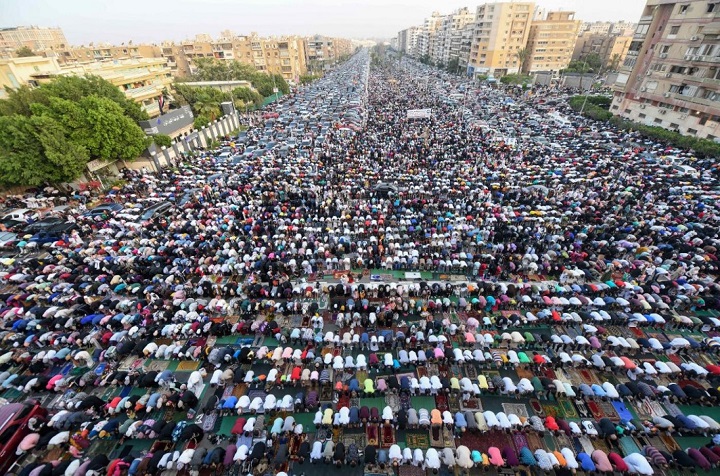Egypt had imposed tight restrictions on Muslim congregational prayers in the holy month of Ramadan and Eid citing Covid-19 rules, triggering widespread anger in the Muslim-majority country.
The restrictions include limiting tarawih night prayers to 30 minutes, closing mosques during the night, and banning Eid prayers in open spaces, and only allow them to be held in a select number of mosques, with imams approved by the government and a single state-sanctioned sermon.
Comment:
The contradictions of the Egyptian government are obvious for all to see. They had found in the coronavirus pandemic a convenient excuse to ban many of the symbols of Islam, and are obviously driven by a desire to lessen the Islamic character of the society in Egypt, as well as control the peoples’ gatherings which have led to large anti-government protests in recent years.
The Prophet (saw) is reported to have said:
«لَيُنْقَضَنَّ عُرَى الْإِسْلَامِ عُرْوَةً عُرْوَةً فَكُلَّمَا انْتَقَضَتْ عُرْوَةٌ تَشَبَّثَ النَّاسُ بِالَّتِي تَلِيهَا وَأَوَّلُهُنَّ نَقْضًا الْحُكْمُ وَآخِرُهُنَّ الصَّلَاةُ»
“The knots of Islam will be undone one by one, each time a knot is undone the next one will be grasped, the first to be undone will be the Ruling and the last will be Prayer.” (Hakim / Ahmed)
It was the Prophet (saw) who tied together the knots of Islam, including the uppermost knot of ruling after he established the Islamic state between the Ansar, the Muhajiroon, and the non-Muslims in and around Yathrib (Medina) after Hijra from his own people of Mecca.
As mentioned by Imam Mawardi the leadership is the succession of the Prophet in protecting the Deen and governing the societal affairs. In this respect – Imam Baidawi mentioned that the Imamate / Khalifah is the succession from the Prophet (saw) in the establishment of the laws of the Shari’ah and the protection of the territory. So without the Imam the laws lie unapplied and the territory is not protected effectively.
The hadith indicates that it is the uppermost knot that keeps the subsequent knots safe from being untied. This is since it is the ruler that is responsible to apply Islam in its entirety, to implement the limits proscribed by Allah (swt) and to protect the society.
Imam Ahmed mentioned without an Imam (for the Muslims as their leader) there would be fitna (strife), and the destruction of the symbols of Islam ending with the Prayer is a great fitna.
However the Egyptian plan has been partially foiled by the public who would not stay silent over the clear munkar (evil) in front of them.
Narrated by Tirmidhi who said the hadith is Hasan on authority of Hudhaifah (ra) that the Messenger (saw) said:
«وَالَّذِي نَفْسي بِيَدِهِ، لَتَأْمُرُنَّ بِالمَعْرُوفِ، وَلَتَنْهَوُنَّ عَنْ المُنْكَرِ أَوْ لَيُوشِكَنَّ اللهُ أَنْ يَبْعَثَ عَلَيْكُمْ عِقَابًا مِنْهُ ثُمَّ تَدْعُوْنَهُ فَلا يُسْتَجَابُ لَكُمْ»
“I swear by whom my soul is in His Authority, You shall enjoin good and you shall forbid evil, or Allah will empower on you the evil ones, then your best ones will call upon Allah and He shall not respond.”
Yayha Nisbet
Media Representative of Hizb ut Tahrir in Britain

